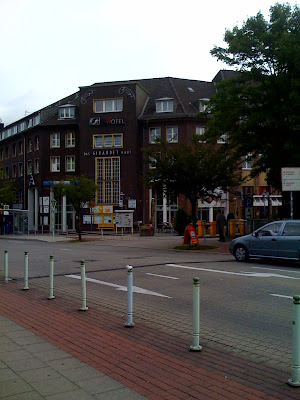
.jpg)
.jpg)
We were in Düsseldorf on Saturday and enjoyed a perfect autumn day along the Rhine. Düsseldorf is NOT a part of the Ruhrgebiet and in spite of its proximity to Essen, its character is very different. Traditionally a very wealthy city, Düsseldorf is known for the long shopping Königsalle with its tree lined canal. A block to the southeast is Heinrich Heine Platz, the entry to the Altstadt and the promenade on the Rhine.
I was struck by the presence of so many Americans underway yesterday. We saw more than one group of the ever-present missionaries from the LDS church. They are easily recognized from a distance with their stylish attire and the telltale black nameplates. Also on the streets of the Düsseldorfer Altstadt were (relatively) young Americans looking to register voters for the coming election in November. Shouldn't these guys be working the neighborhoods of Houston or Chicago? It must be nice to sign up for volunteer work and wind up with the Düsseldorf beat, whether you're winning votes or souls.
Being a thoroughly responsible citizen, I've already done the paperwork for the November election. I'll get a letter in the mail soon from Cache County and I'll be able to cast my vote (or as we sometimes say in Utah, "spit into the wind") by absentee ballot. We returned home to Essen at the end of a long day, thinking about the upcoming election and we raised a glass of Düsseldorfer Altbier to the second Article of the U. S. Constitution and the Electoral College.










.jpg)








